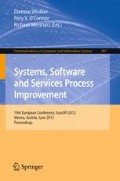Abstract
The authors propose a conceptual framework to extend their previous research on innovation capability determination to innovating innovation. Based on an expert analysis of process assessments the authors conclude that innovation, in particular the holistic understanding of innovation dimensions, has not yet been the focus in organizations. Most of our applied research indicates a clear focus on incremental product and/or process innovation. The authors argue that the interdependency of the proposed 14 innovation dimensions is essential for a future driven approach to innovation assessments based on uncertainty. The findings also include an innovation view on the SPI Manifesto developed at EuroSPI 2010.
Access this chapter
Tax calculation will be finalised at checkout
Purchases are for personal use only
Preview
Unable to display preview. Download preview PDF.
References
Abernathy, W.J.: The Productivity Dilemma: Roadblock to Innovation in the Automobile Industry. The John Hopkins Press, London (1978)
Amit, R., Shoemaker, P.: Strategic Assets and Organizational Rent. Strategic Management Journal 14, S33–S46 (1993)
Hamilton, B.A.: The Customer Connection: The Global Innovation 1,000 (2007), www.boozallen.com/news/2007Innovation1000
Byrne, M.: Frost & Sullivan identifies top global mega trends (2011), http://www.smeadvisor.com/2011/04/frost-sullivan-identifies-topglobal-mega-trends/ (accessed: March 16, 2012)
Chesbrough, H.: Open Business Models: How to Thrive in the New Innovation Landscape. Harvard Business School Press, Boston (2006)
Chesbrough, H., Vanhaverbeke, W., West, J.: Open Innovation – Researching a New Paradigm. Oxford University Press, New York (2006)
Christensen, C.M.: The Innovator’s Dilemma. Harvard Business School Press, Boston (1997)
Christensen, C.M., Raynor, M.M.: The Innovator’s Solution – Creating and Sustaining Successful Growth. Harvard Business School Press, Boston (2003)
Cooper, R.G., Edgett, S.J.: Lean, Rapid and Profitable: New Product Development. Product Development Institute, Ancaster (2005)
Cooper, R.G., Edgett, S.J.: Maximizing Productivity in Product Innovation. Research Technology Management 51(2), 47–58 (2008)
Cooper, R.G., Edgett, S.J.: Overcoming the Crunch in Resources for New Product Development. Research Technology Management 46(3), 48–58 (2003)
Cooper, R.G., Edgett, S.J., Kleinschmidt, E.J.: New Problems, New Solutions: Making Portfolio Management More Effective. Research Technology Management 43(2), 18–33 (2000)
Cooper, R.G., Edgett, S.J.: Developing a Product Innovation and Technology Strategy for Your Business. Research Technology Management 53(3), 33–40 (2010)
Cooper, R.G., Edgett, S.J.: Maximizing Productivity in Product Innovation. Research Technology Management 51(2), 47–58 (2008)
Cooper, D.R., Schindler, P.S.: Business Research Methods, 9th edn. McGraw-Hill, London (2006)
Dooley, Subra, Anderson: Maturity and its impact on new product development project performance. Research in Engineering Design 13(1) (August 2001)
Eisenhardt, K.M.: Building Theories from Case Study Research. Academy of Management Review 14(4), 532–550 (1989)
Freeman, C., Clark, J., Soete, L.: Unemployment and Technical Innovation: A Study of Long Waves and Economic Development. Frances Printer, London (1982)
Hopfenbeck, W., Peisl, T., Müller, M.: Wissensbasiertes Management, Managementkonzepte in der Internet Ökonomie. MI Verlag (2001)
Horx, M.: Theorie der Trend- und Zukunftsforschung (2010), http://www.horx.com/Zukunftsforschung/2-01.aspx#Hdr (accessed: August 15, 2011)
ISO/IEC 15504-2:2003: Information technology – Process assessment – Part 2: Performing an Assessment
ISO/IEC TR 15504-7:2008: Information technology – Process assessment – Part 7: Assessment of Organizational Maturity
Kim, Mauborgne: Blue Ocean Strategy. How to create uncontested market space and make the competition irrelevant. Harvard Business School Press, Boston (2005)
Kaplan, Norton: The Balanced Scorecard. Translating Strategy into Action. Harvard Business School Press, Boston (1996)
Novitski, B.J.: Understanding megatrends helps firms plan for the future. Architectural Record 197(8) (2009)
O’Connor, J., Seymour, J.: Introducing NLP. HarperCollins, London (2002)
Peisl, T.: Barrieren in Veränderungsprozessen. Ein Erklärungsmodell für das Scheitern von Veränderungsprozessen in Mittel- und Großunternehmen. Dissertationsschrift (1995)
Peisl, T., Schmied, J.: Connected Innovation: Innovation Capability dEtermination (ICE), International SPICE Days. Frankfurt/Main (2007)
Peisl, T., Schmied, J.: Improvement through Innovation. In: International SPICE Days, Prag (2008)
Peisl, T., Reger, V., Schmied, J.: Innovation Process Design: A Change Management and Innovation Dimension Perspective. In: O’Connor, R.V., Baddoo, N., Cuadrago Gallego, J., Rejas Muslera, R., Smolander, K., Messnarz, R. (eds.) EuroSPI 2009. CCIS, vol. 42, pp. 117–127. Springer, Heidelberg (2009)
Porter, M.E.: Competitive Advantage: creating and sustaining superior performance. Free Press, New York (1985)
Sawhney, Wolcott, Arroniz: The 12 Different Ways for Companies to Innovate. MIT Sloan Management Review 47(3), 75–81 (2006)
Saunders, M., Lewis, P., Thornhill, A.: Research Methods of Business Students, 5th edn. Pearson Education Limited, Harlow (2009)
Schmied, Wentzel, Gerdom, Hehn: Mit CMMI Prozesse verbessern. dpunkt (2008)
Schumpeter, J.: Capitalism, socialism and democracy, 4th edn. Allen & Unwin Ltd., London, UK Edit. 1942 (1935)
Software Engineering Institute (SEI): CMMI for Development: Guidelines for Process Integration and Product Improvement (SEI Series in Software Engineering), 3rd edn. Addison-Wesley Longman, Amsterdam (2011)
Software Engineering Institute (SEI): CMMI® for SCAMPI(SM) Class A Appraisal Results 2011 End-Year Update; Carnegie Mellon University, Pittsburgh, http://www.sei.cmu.edu/cmmi/casestudies/profiles/pdfs/upload/2012MarCMMI.pdf
Software Engineering Institute (SEI): Standard CMMI Appraisal Method for Process Improvement (SCAMPI) A, Version 1.3: Method Definition Document; CMU/SEI-2011-HB-001, http://www.sei.cmu.edu/reports/11hb001.pdf
Tidd, J., Bessant, J.: Managing Innovation: Integrating Technological, Market and Organizational Change, 4th edn. John Wiley & Sons, West Sussex (2009)
Tushman, M.L., Anderson, P.: Technological Discontinuities and Organizational Environments. Administrative Science Quarterly 31(3), 439–465 (1986)
Yin, R.K.: Case Study Research: Design and Method, 3rd edn. Sage, London (2003)
Author information
Authors and Affiliations
Editor information
Editors and Affiliations
Rights and permissions
Copyright information
© 2012 Springer-Verlag Berlin Heidelberg
About this paper
Cite this paper
Peisl, T., Schmied, J. (2012). Innovating Innovation: A Conceptual Framework. In: Winkler, D., O’Connor, R.V., Messnarz, R. (eds) Systems, Software and Services Process Improvement. EuroSPI 2012. Communications in Computer and Information Science, vol 301. Springer, Berlin, Heidelberg. https://doi.org/10.1007/978-3-642-31199-4_19
Download citation
DOI: https://doi.org/10.1007/978-3-642-31199-4_19
Publisher Name: Springer, Berlin, Heidelberg
Print ISBN: 978-3-642-31198-7
Online ISBN: 978-3-642-31199-4
eBook Packages: Computer ScienceComputer Science (R0)

